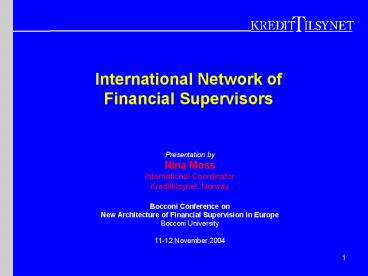International Network of Financial Supervisors - PowerPoint PPT Presentation
1 / 18
Title:
International Network of Financial Supervisors
Description:
11-12 November 2004. Supervisory and regulatory cooperation is necessary in order ... Integration of standards amalgamation of sectoral standards into common ... – PowerPoint PPT presentation
Number of Views:66
Avg rating:3.0/5.0
Title: International Network of Financial Supervisors
1
International Network ofFinancial Supervisors
- Presentation by
- Nina Moss
- International Coordinator
- Kredittilsynet, Norway
- Bocconi Conference on
- New Architecture of Financial Supervision in
Europe - Bocconi University
- 11-12 November 2004
2
Why international cooperation?
- Supervisory and regulatory cooperation is
necessary in order to develop and enforce common
international standards which will enhance the
efficiency and integration of financial markets
and allow marketplayers and consumer to benefit
from free flow of capital and services
3
International cooperation
- Prerequisite for ensuring
- Global financial stability in cooperation with
central banks - Financial stability fosters economic growth
- Financial crises prevent growth
- Efficient and integrated financial markets
- Development of international standards
- Level playing field
- Mutual recognition
- Prevent the (ab)use of the financial system for
criminal purposes - Money-laundering - terror-financing
- End objective to benefit market players and
consumers locally and globally - ?Informal and formalized cooperation
4
Modus Cooperandi
- Bilateral (MoUs) common interests /
establishments - Regional level or based on mutual interests or
commonalities (e.g. language, culture) and
actual cross-border integration - EU (EEA) level (political framework)
- Global level Supervisory fora, multilateral
MoUs - ?Many organizations and fora for international
cooperation
5
Supervisory Cooperation within the EU/EEA Level
3 Lamfalussy model
Coordination 3L3
Committee of European Insurance and
Occupational Pensions Supervisors CEIOPS
Committee of European Securities Regulators CESR
Committee of European Banking Supervisors CEBS
Groupe de Contact
Various subcommittees and expert groups
6
EU
EUs financial architecture Lamfalussy model
Level 1
ECOFIN Council
EU Parliament
Coreper
EFC
ECB
Council WGs
FSC
EU Commission
BSC
Level 2
BAC (EBC)
Insurance Committee (EIOPC)
European Securities Committee ESC
Accounting Regulatory Committee ARC
Europ. Financial Conglomerates Committee EFCC
Committee of Europ. Ins. and Occupation. Pensions
Supervisors CEIOPS
Committee of European Securities Regulators CESR
Committee of European Banking Supervisors CEBS
Level 3
Roundtable of Regulators
Groupe de Contact (GdC)
Various subcommittees and expert groups
NM2004
7
Global cooperation
- IOSCO established 1983 (183 members)
- IAIS established 1994 (100 members)
- Basel Committee since 1974 not truely global
- IOPS established 2004 (24 members in July)
- Supervisors also directly or indirectly involved
in - FATF (Financial Action Task Force on Money
Laundering) - OECD
- IASB (International Accounting Standards Board)
8
Main Focus
- Convergence of supervisory practice
- International Standards
- Drafted by supervisors within the supervisory
fora - Consultation with the industry and other fora
(IMF, World Bank etc) - Adopted at general meetings
- ?Enforcement of standards
- How can compliance be ensured?
9
Evaluation of compliance
- Self-evaluations
- Peer reviews mutual evaluations
- Evaluations by independant bodies
- IMF/World Bank
- Role as supervisors of supervisors?
- Financial Sector Assessment Program (FSAP)
10
Global cooperation
Financial Stability
Supervision and regulation
Central Banks/Monetary institutions
Basel Committee ICBS
IMF
BIS
IOSCO
IAIS
World Bank
IOPS
Joint Forum
Financial Stability Forum G7
Integrated Financial Supervisors
OECD
FATF
Accounting (IASB) Corporate Governance
11
International network still sector-specific
- Challenges with regard to
- Regulation and supervision of financial
conglomerates - Avoiding regulatory arbitrage
- Financial stability
- Macro-economic surveillance
- Crisis management
12
Solutions
- Coordination among the various fora
- Cooperation with central banks and other
institutions - Establishment of
- Joint Forum (1996)
- Financial Stability Forum (Asian Crisis)
13
Solution at national levelIntegration of
financial supervisory authorities
- 1984 Singapore (MAS)
- 1986 Norway (Kredittilsynet)
- 1987 Canada
- 1988 Denmark - Malta
- 1991 Sweden
- ?then followed Iceland, UK, Australia, Japan,
Korea, Hungary, Ireland, Latvia, Estonia,
Germany, Austria, Belgium - In the process Netherlands
14
Informal network of integrated financial
supervisors
- Conference of Integrated Financial Supervisors
- Since 1999 -meet informally once a year to
exchange information on experiences related to
the organization of an integrated supervisor - Integrated supervisors from
- Australia, Austria, Belgium, Canada, Denmark,
Germany, Hungary, Iceland, Ireland, Japan, Korea,
Netherlands, Norway, Singapore, Sweden, UK
15
Overview of multilateral organisations for
financial stability, supervision and regulation
Global cooperation
ICBS (Basel Committee)
IMF
BIS
IOSCO
IAIS
FATF
World Bank
Joint Forum
Integrated Financial supervisors
Financial Stability Forum G7
OECD
IOPS
IASB
EU/EEA
Banking Advisory Committee BAC
Insurance Committee IC
European Securities Committee ESC
Accounting Regulatory Committee ARC
ECB
BSC
CEIOPS (insurance and pensions)
Committee of European Securities Regulators (CESR)
CEBS (banking sup)
Groupe de Contact (GdC)
Committees and Expert groups
Regional
Nordic Cooperation
Nordic/Baltic Cooperation
(e.g)
NM2004
16
Managing international cooperation
- A challenge to keep up with international
developments (and not lose sight of domestic
issues) - Costly network
- ? Secretariat expenses
- ? Budgetary implications for supervisors
- Resource allocation
- Membership fees
- Travel costs
- ? Particularly burdensome for integrated
supervisors?
17
(No Transcript)
18
International cooperation in the future
- ?amalgamation integration?
- Integration of supervisory fora into one joint
organization? - enhance efficiency and effectiveness
- Integration of standards amalgamation of
sectoral standards into common standards for the
whole financial sector? - One common integrated supervisory authority at EU
level? - ? Overcome political, economic, cultural, social
and linguistic differences































